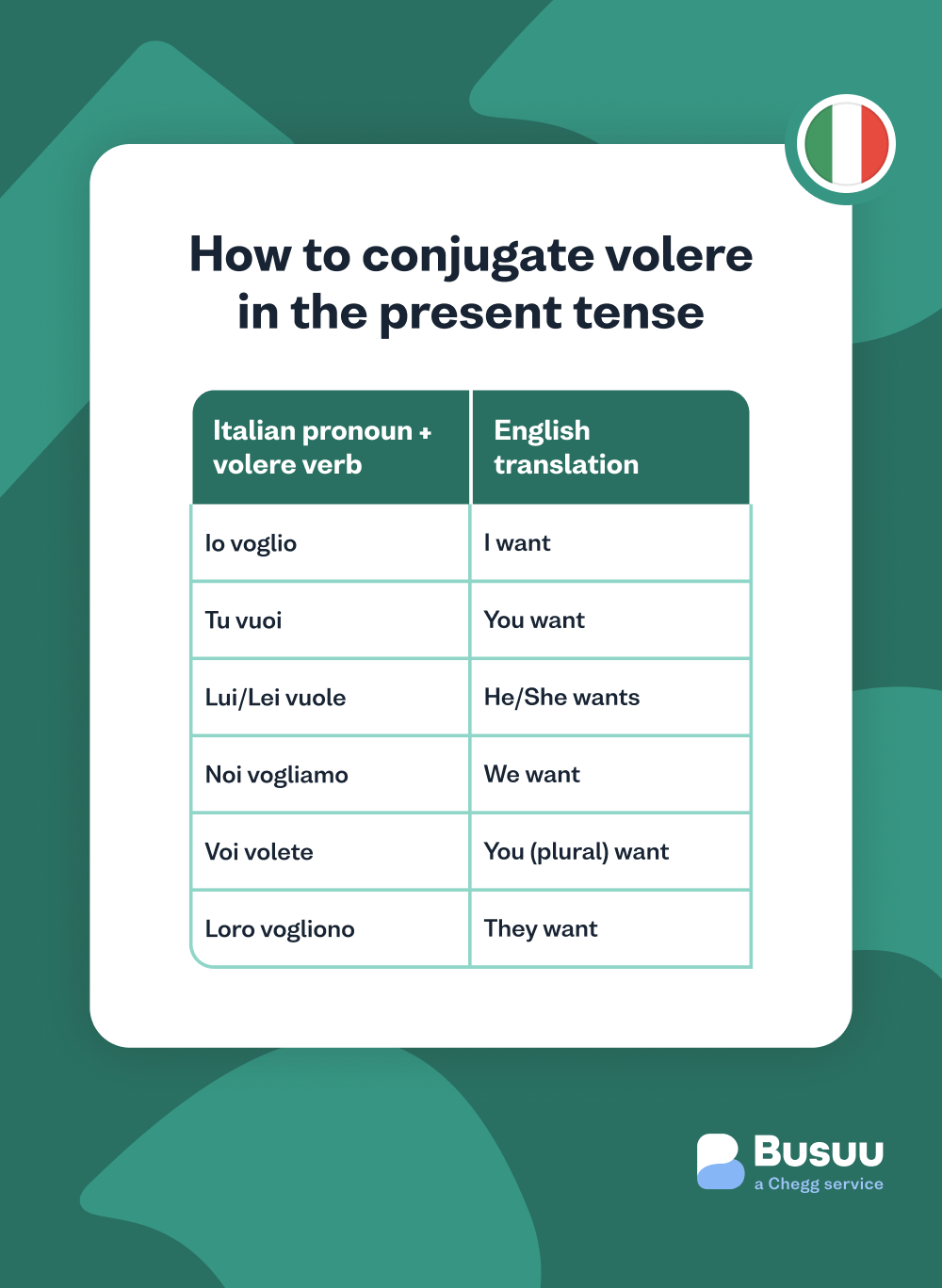Conjugation of Volere (To Want) in Italian
Learn how to use the Italian verb “volere” (to want) to order, make requests or say what you would like.
I want to learn...
In Italian, volere means “to want”. Today, we’ll learn how to conjugate the verb “to want” in different tenses like the present, past and future. It’s crucially the reference verb for making requests or questions and expressing desires. This makes the verb volere particularly useful if you need to find out more information about something.
However, while it ends in -ere, it’s not a regular verb. The only way to begin using volere is to commit each of its conjugations to memory. Let’s get started!
Volere conjugation in the present tense – indicativo presente
First up is the simple present tense. Remember, the gli sound in Italian is a soft -ly sound.
See the chart below for the present tense of volere plus its English translation:

How to conjugate volere in the present tense
| Italian pronoun + volere verb | English translation |
|---|---|
| Io voglio | I want |
| Tu vuoi | You want |
| Lui/Lei vuole | He/She wants |
| Noi vogliamo | We want |
| Voi volete | You (plural) want |
| Loro vogliono | They want |
Pro-tip: Italians often omit the subject pronoun (I, you, he, she, etc.) when it’s clear who is doing the action from context. For example, it’s possible to say “Io voglio un gelato” (I want an ice-cream) without “Io”, becoming “Voglio un gelato”.
Here are some examples of volere in the indicativo presente in a sentence:
- Voglio provare quel vino. (I want to try that wine.)
- Vuoi un po’ di succo? (Do you want some juice?)
- Lo vogliono o no? (Do they want it or not?)
The simple present tense of volere is incredibly useful, but Italians find it rude to make requests in polite settings, like a restaurant or a shop, using this form. Instead, it’s better to use the conditional form of volere. We’ll get to that in a moment.
Volere is a helping verb
Before we get to more tenses and moods of volere, you should know that it is a modal verb, just like potere (to be able to) and dovere (to have to, to must). This means that it “helps” other verbs. In Italian, you can combine these verbs with an infinitive (an unconjugated verb; equivalent to “to + any verb” in English) to change the meaning.
In the case of volere, when it acts as a modal verb, it expresses the desire to do something. For example:
-
Io + volere + mangiare = I want to eat
Voglio mangiare la pizza. (I want to eat the pizza.) -
Lui/lei + volere + andare = He/she wants to go
Vuole andare al parco. (He/she wants to go to the park.)
The second verb, like mangiare or andare in the examples above, will stay in the infinitive form. This means you won’t change it.
Advanced tip: When volere is in this modal verb form, and you have a direct or indirect object pronoun, you can take off the final letter of the infinitive verb and attach the pronoun to the end. Example: “Lo voglio comprare” (I want to buy it) can become “Voglio comprarlo”. This doesn’t change the meaning.
Volere Conjugation in the conditional – condizionale presente
The conditional mood indicates the possibility of something. In English, it’s equivalent to “would”.
When it comes to the verb volere, Italians often use the conditional form for making requests or ordering food because it feels less commanding. The difference is similar to saying “I would want/like” instead of “I want” in English.
How to conjugate volere in the conditional tense
| Italian pronoun + volere verb | English translation |
|---|---|
| Io vorrei | I would want |
| Tu vorresti | You would want |
| Lui/Lei vorrebbe | He/She would want |
| Noi vorremmo | We would want |
| Voi vorreste | You (plural) would want |
| Loro vorrebbero | They would want |
This form is great to use when asking for something politely or expressing a wish. See how that looks in these examples, with the conditional volere verb (bold) below:
- Vorrei un caffè. (I would like a coffee.)
- Vorresti le mie vecchie scarpe? (Would you want my old shoes?)
- Vorremmo andare al cinema più spesso.(We’d like to go the cinema more often.)
- Vorrebbe una birra, per favore. (He would like a beer, please.)
Present perfect – passato prossimo
Italian has two commonly used past tenses: imperfetto and passato prossimo.
Passato prossimo is used for an action that has already started and finished by the time of speaking. It’s formed of two components: the auxiliary and the past participle of volere, which is voluto.
To conjugate volere in this tense, we use either avere (to have) or essere (to be) as the auxiliary. Which one you use depends on the verb following volere – see our guide to passato prossimo for more details on knowing which auxiliary to use with a verb – but typically verbs of movement like andare or states of being will use the essere auxiliary.
How to conjugate volere in the present perfect with avere
| Italian pronoun + auxiliary + volere verb | English translation |
|---|---|
| Io ho voluto | I have wanted |
| Tu hai voluto | You have wanted |
| Lui/Lei ha voluto | He/She has wanted |
| Noi abbiamo voluto | We have wanted |
| Voi avete voluto | You (plural) have wanted |
| Loro hanno voluto | They have wanted |
And here is the conjugation chart for volere with essere as the auxiliary:
How to conjugate volere in the present perfect with essere
| Italian pronoun + auxiliary + volere verb | English translation |
|---|---|
| Io sono voluto/a | I have wanted |
| Tu sei voluto/a | You have wanted |
| Lui/Lei è voluto/a | He/She has wanted |
| Noi siamo voluti/e | We have wanted |
| Voi siete voluti/e | You (plural) have wanted |
| Loro sono voluti/e | They have wanted |
When we conjugate volere with essere as its auxiliary, the past participle voluto will agree with the pronoun’s number (plural or singular) and gender (masculine or feminine), so the ending will change:
- Voluto = singular masculine
- Voluta = singular feminine
- Voluti = plural masculine
- Volute = plural feminine
Let’s take a look at some examples of volere in passato prossimo:
- Non sono voluta andare al mare, mi dispiace. (I didn’t want to go to the beach, sorry.)
- Siamo voluti arrivare prima alla festa. (We wanted to arrive early to the party.)
- Si sono voluti sposare a giugno. (They wanted to get married in June.)
- Ha voluto pagare la cena. (He/she wanted to pay for the dinner.)
Volere in passato prossimo is different from “to have wanted” in English, because unlike English, the outcome is almost always certain – if you wanted something, you got it. If they wanted to do something, they did it. If you’re wanting to suggest more ambiguity or uncertainty, then use our next tense: l’imperfetto.
Imperfect – imperfetto
Our second past tense, l‘imperfetto indicates an action that lasted for a long or undefined amount of time in the past. Unlike passato prossimo, which generally indicates an action that happened once, l’imperfetto is used for past actions that happened repeatedly or continuously.
How to conjugate volere in the imperfect tense
| Italian pronoun + volere verb | English translation |
|---|---|
| Io volevo | I wanted |
| Tu volevi | You wanted |
| Lui/Lei voleva | He/She wanted |
| Noi volevamo | We wanted |
| Voi volevate | You (plural) wanted |
| Loro volevano | They wanted |
Let’s see this tense in some examples:
- Da piccolo, volevo diventare un cantante. (When I was little, I wanted to become a singer.)
- Non voleva mai indossare abiti. (She never wanted to wear dresses.)
- Volevate i tovaglioli blu? (Did you want the blue napkins?)
- Come al solito volevano alzarsi presto per vedere l’alba. (As usual, they wanted to get up early to see the sunrise.)
Simple future – futuro semplice
Let’s go back to the future. In addition to referring to actions or events that will happen, Italians also use this tense to express doubt or speculation.
How to conjugate volere in the simple future tense
| Italian pronoun + volere verb | English translation |
|---|---|
| Io vorrò | I will want |
| Tu vorrai | You will want |
| Lui/Lei vorrà | He/She will want |
| Noi vorremo | We will want |
| Voi vorrete | You (plural) will want |
| Loro vorranno | They will want |
This is how this tense looks in Italian:
- Quando sarò in pensione non vorrò più sentire parlare di lavoro. (When I retire, I won’t want to hear about work anymore.)
- Vorrà sentirlo prima per telefono. (He’ll want to hear it on the phone first.)
- Vorranno sicuramente dividere il conto al ristorante. (They will definitely want to split the bill at the restaurant)
Gerund – gerundio
We’re nearly done but today’s final section is on the gerund form. In English, this looks like “wanting”. Gerundio expresses an action that is happening currently or an action that is having an effect on another action.
How to conjugate volere in the gerund form
| Present | English translation | Past | English translation |
|---|---|---|---|
| Volendo | wanting | Avendo voluto | having wanted |
- Non volendo fare tardi, ho preso la metro. (Not wanting to be late, I took the metro.)
- Avendo voluto cambiare lavoro, Isabella aggiorna il suo CV. (Having wanted to switch jobs, Isabella updates her CV.)
You wanted to learn how to say “to want” in Italian.
Now you’ve done it!
Volere is a special verb and all its conjugations might seem overwhelming. In fact, there are even more tenses and moods to learn of volere, but don’t worry. What you’ve learned today are the most important conjugations of volere to learn right now and with practice, it’ll come naturally.
At Busuu, our goal is to help Italian learners pick up the skills they need to begin having conversations today!
Unlock your Italian potential with Busuu!
Who says learning Italian has to be boring? At Busuu, we provide Italian learners like you with engaging free online courses crafted by language experts, plus a growing online community of Italian speakers.

